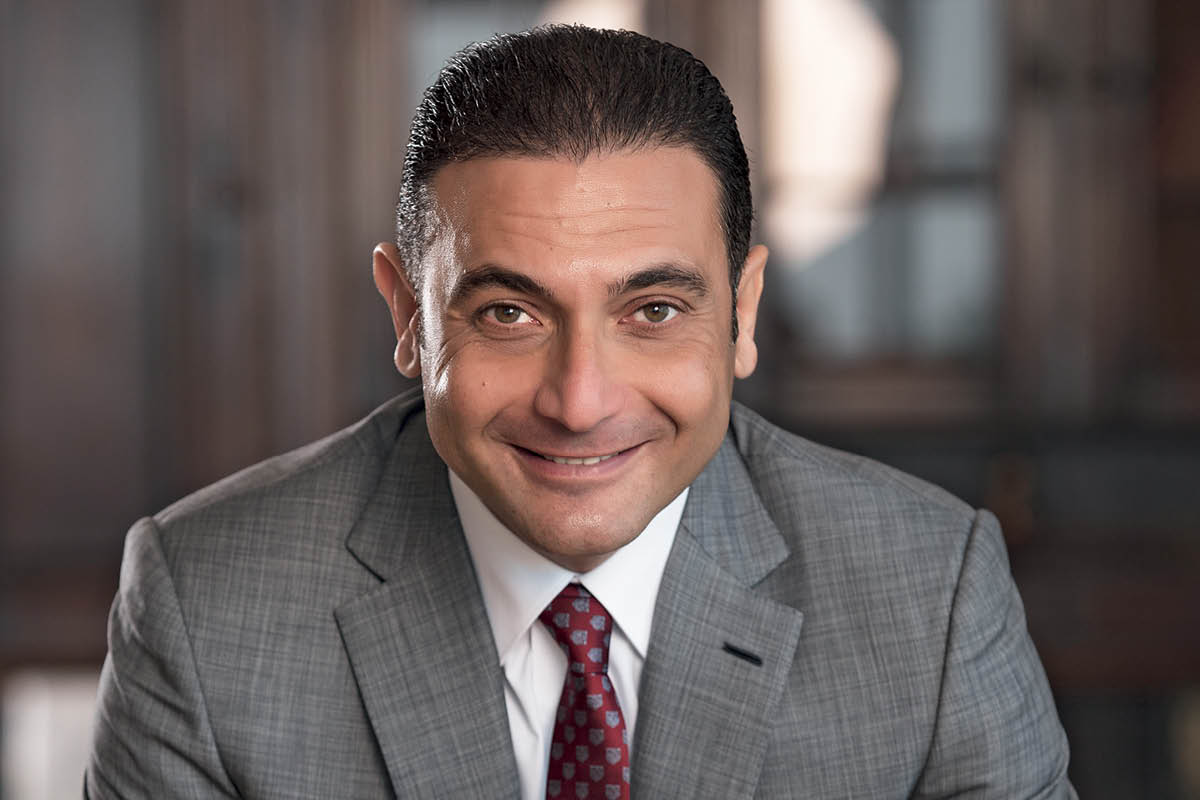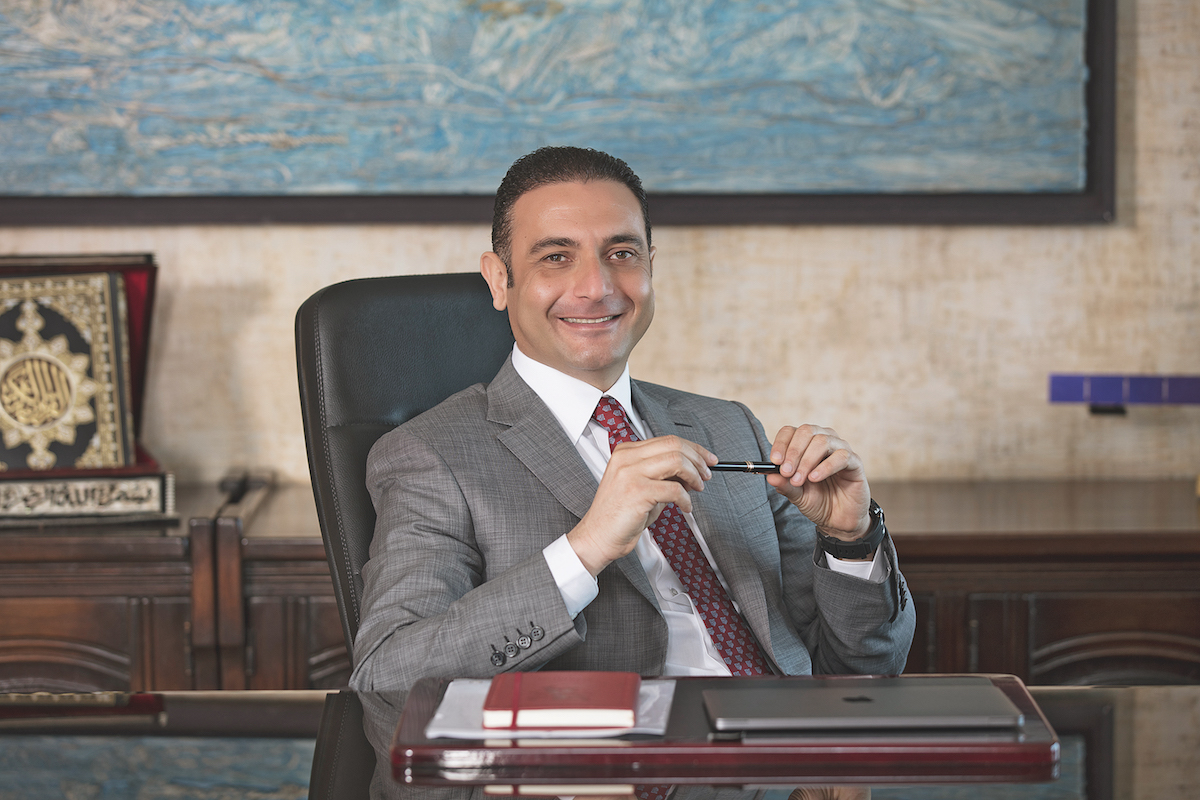The history of telecommunications in Egypt wouldn’t be complete without that of Telecom Egypt (TE). The telecommunications giant began with the installation of the first telegraph line connecting Cairo and Alexandria in 1854. This kicked off a string of telecommunications services that it has since provided to keep the country connected to this day.
Currently leading the business is CEO Ahmed El Beheiry, who started his career with mobile phone company Alcatel in early 1996. At the time, Alcatel was working for TE’s predecessor, the Arab Republic of Egypt National Telecommunication Organization (ARENTO).

“I joined Alcatel at the dawn of the mobile industry in Egypt,” Ahmed tells The CEO Magazine. “Alcatel at the time was contracted by ARENTO and I was working as a design engineer for its mobile design.
“From 1996 to 1997, I had the chance to get to know TE quite well because I travelled all over the country, making the designs for the mobile networks in and around TE. So I became familiar with its people, their abilities and their culture.”
After his time at Alcatel, in 1998 Ahmed joined Mobinil (currently Orange Egypt) assuming various positions, the last of which was as Networks and Roaming Director. Afterwards, he moved into private business.
“I started my own business and created a telephone service,” says Ahmed. “It was a telecom and information technology service company… It was quite successful in Egypt and overseas.”
Ten years later, Ahmed opted to move into a role with the government. There he was offered the opportunity to join TE as a non-executive board member. And, in March 2017, he signed on to the role of CEO.
Ahmed explains that he joined at a time when TE was establishing its full mobile operation. “It was doubtful, at the time, whether we would be able to launch a mobile network,” he says. “So I had a clear objective, which was to make it happen.”
The mobile licence was a massive step for TE in getting its mobile operations off the ground, but there were still some major obstacles to overcome. “No-one believed we would be able to do it,” Ahmed continues, “because there was actually nothing contracted to launch the mobile operations. No sites, no core network, no sim card, no scratch card, no business plan, nothing.”
Nevertheless, he persevered. “TE is a very powerful organisation,” he says. “I actually saw a lot of strengths. I saw a humungous organisation distributed all over Egypt – north to south, east to west – with a presence in all the major and minor cities. That is the big difference between us and our competitors because they are not on the ground everywhere. They use outsourced distribution centres to reach their customers.”
Another strength Ahmed saw was TE’s strong connection to its customers. “My people are the nearest to the customer because ‘people choose to be with those they can relate to’,” he adds.
“My people know the customer well.”
Launching a mobile network
With a history spanning more than 160 years, TE has the widest and most advanced network in the telecommunications market. It is 80% owned by the Egyptian government and is one of the largest telecom providers in the Middle East and Africa. At the end of 2017, it had more than seven million fixed voice subscribers and 4.1 million fixed broadband subscribers.
Guiding TE through the launch of its mobile network was one of the first and most significant changes Ahmed made when he took over as CEO. “It was seen by many in the industry as the biggest change ever in TE,” he says. “It was a shock to them because no-one had really moved that fast in the company as it is so big – with more than 50,000 employees. But I knew that if I didn’t move fast, it wouldn’t work.
“Time was ticking because there it was announced that TE would launch the mobile network in September, even though there was nothing on the ground to justify such an announcement. It took 6 months between my start date to the launch of our mobile network on 18 September 2017 – a remarkable story.”
TE’s mobile network was launched through its retail brand ‘WE’. The network ultimately made TE the first fully integrated telecom provider in Egypt, providing its customers total telecom services including fixed lines, mobile and data services.
“We believe we have done incredibly well gaining approximately three million mobile subscribers in the first six months since launch,” Ahmed says. “This shows that our customers are very receptive of our value propositions, especially on the data side, as we aim to own the data platform across technologies in the Egyptian market. To date, we have exceeded our ambitions and targets, and we expect to continue to offer new and innovative products to meet our customers’ expectations.”
“To date, we have exceeded our ambitions and targets.”
Ahmed explains launching mobile services is pivotal to TE’s long-term strategy and allows it to leverage its strong retail reach and countrywide infrastructure. Plus, it benefits from the growing need for mobile data as younger generations expect to be connected 24/7.
“Because TE was stagnant for years, I’m trying to change the perspective of the business,” he says. “We did a lot in one year; just six months ago, there was no brand called WE. Today, this brand is competing against Vodafone, Orange and Etisalat, and is doing very well. This is the culture I want the company to have.”
Ahmed further adds he wants the organisation to be structured around brand value. “I am a big believer in a brand value-driven organisation,” he says. “I tell my team we have to deliver, reach our goals and be successful through our brand value.”
“I tell my team we have to deliver, reach our goals and be successful through our brand value.”
In the coming years, Ahmed aims to grow WE both inside the mobile market as well as in the broader telecommunications market. He wants to expand WE from mobile-only products to a whole suite of products and, by 2019, he plans to take it overseas.

Customer care
Another area Ahmed revamped was TE’s internal team. He replaced nearly half the executive team with high-calibre staff. “We have a unique blend of employees. They have their own identities and capabilities. They have a lot of experience in how government bodies work.”
Ahmed further strengthened the company by emphasising a strong, customer-centric approach. This led to the creation of the role of customer care vice president. Two months after this role was created, on the night TE’s mobile network was launched, the company had 400 customer care representatives ready to take their first calls from new customers. That number has since doubled to 800 and the company is looking to move this customer-centric approach to the fixed internet and the fixed phones as well. Ahmed is now aiming for a total of 3,000 customer service representatives.
Preserving Telecom Egypt’s history
Telecom Egypt established a telecommunications museum in 2010 to preserve several devices and equipment from its early history. It also serves to provide evidence of the different stages of the country’s telecommunication history. The museum is located within the company’s training sector and includes telephone sets, switches, fibre optics, projectors and microfilm and historical documents throughout TE’s history.
The year of opex
Ahmed considers 2018 the year of operational expenditure (opex) for TE, compared with 2016 and 2017, which had significant capital expenditure (capex), and lacked strong procurement capability.
“The mobile industry was built on procurement and I was there at the start of it,” Ahmed says. “So then when the internet happened, this procurement-centric approach was emphasised in the industry.
But TE lived on its own isolated island; it kept trying to get the best prices, but lacked the know-how. So when I came here, we started seeing the capex stabilise and the company adopted a more procurement-centric approach.”
Ahmed adds that despite its level of capex in 2017, TE still spent less than it did in 2016. “In 2017, we bought everything,” he says. “We bought the core network, the radio network and the scratch cards. We developed a new brand, we did a successful brand repositioning, and we carried out the biggest-ever advertising media campaign in the history of TE.
“We supported Egypt’s national soccer team to reach the World Cup, in Russia, for the first time in 28 years. On top of that, we acquired people and made major upgrades in the core and access network infrastructure.”
One of the ways the capex was reduced was through a shift in pricing.“If we went with the same level of prices, we would have at least tripled the capex, which would not have been possible,” Ahmed continues. “We saved a lot of capex, which is likely more than US$970 million over five years to establish the complete mobile network, this is the equivalent of 50% capex savings annually. So this is what I say to my team: ‘2017 was the year of capex, 2018 will be the year of opex’.
“I have this vision of squeezing our opex and trying to get the best operational efficiency I can out of it and this is the main potential of our organisation. Telecom Egypt as a company has huge ability but significant inefficiency.
“So to move it, you have only one rule and it is simple: If the opportunity is there, grab it with both hands, but if you move inefficiently you will die. So you need to find the inefficiencies and kill them, become very efficient. This way you will find yourself reaching your goal with ease, compared with other organisations, because that is when the huge abilities of the company rise to the surface.”
“If the opportunity is there, grab it with both hands, but if you move inefficiently you will die.”
The key is to diversify
One of TE’s other strengths is providing submarine communication cables to carry telecommunication signals further. In 2018, TE announced the US$90 million acquisition of the Middle East and North Africa (MENA) submarine cable, which connects Europe to the Middle East and South-East Asia.
“The MENA cable is expected to achieve a short-term return on investment and preserve the revenue stream of the cable systems’ segment,” Ahmed says. “It is part of our network of 13 cables across Egypt and has provided our network a new gateway to India, as well as redundancy for our other cables.”
Further, Ahmed sees a lot of potential in Egypt’s telecom market and has big plans to diversify TE’s offerings. “The potential lies mainly in the expected growth of data penetration and usage,” he says. “Although the penetration rate of mobile lines is already above 100%, mobile data penetration is still around 30%. In addition, Egypt’s population has a yearly growth rate of around 3%, with close to 50% of the population below the age of 25 – a relatively young generation that demands constant connectivity, collaboration and creativity. We believe we are ideally positioned as a total telecom provider to meet those needs, and aim for a 10% market share over the next five years.”
Another major opportunity Ahmed sees is in TE investing in information and communications technology. “This is one of our main priorities in the coming years. We are looking to provide fully integrated business solutions, managed services and cloud computing, and to expand our data centre’s presence, develop our big data and IoT capabilities and explore other mobile-enabled services such as banking,” he says.
“We are still the only player with fixed phones, so just think of the potential of having Egypt as a hub for the cloud computing… plus, being 80% owned by the government is an edge when you are looking at security.”
It is one of Ahmed’s visions for Egypt to be seen as a vital digital route. “Egypt, geographically, is positioned where physical routes can move between west and east, and north and south,” he says. “We want to capitalise on that, and have Egypt seen as a digital route for data.”
However, he admits there is still potential for a significant amount of disruption in the future. “The sector is characterised by continuous disruptions with the emergence of new technologies,” Ahmed says. “We have seen the impact of data adoption on customers behaviour, and the significant impact the rise of over-the-top players has had on telecom companies. We expect to see more disruption soon – especially with the commercial launch of 5G – as new services become mainstream; namely cloud computing and machine-to-machine services.”

Team work
If there is one thing Ahmed was serious about transforming when he joined TE, it was to strengthen the company’s relationships with its suppliers and partners. In terms of its partnerships, over the past 3 years, TE has signed and renewed several wholesale agreements with three mobile operators in Egypt as part of its strategy to maximise commercial cooperation. It has agreements for international and infrastructure services with Orange, Etisalat and Vodafone.
Enhancing TE’s supplier relationships required more work as Ahmed strongly believes that the mobile industry is built on procurement and the supply chain. “When I started, I found TE lacked 20 years of standardisation on the ground,” he says. “Before, it was more like a supplier-managed organisation. The suppliers were giving it the vision and designs, and the staff were used to that kind of management. So I had to change that mindset.”
Ahmed instead emphasised that it is TE that sets the goals, directions and numbers, and then discusses them with its suppliers. He points out that suppliers have a prominent and respectable role in the delivery chain of any telecom service. “When you reset the relationship with the supplier, you not only get the best prices, but you get the best implementation of the right process. There is great demarcation between when the role of the operator finishes, and the role of the supplier starts. And this is important. This handshake between an operator and a supplier is the critical point where you can check the success of any organisation.”
Continuing the connection
While TE enjoys a strong presence in terms of fixed voice and broadband services, it is relatively new to the mobile network scene, but Ahmed sees so much ahead for it in the future.
“We came in late, but I still see opportunities around me that I want to catch,” he says. “And because we are coming in late, we seize any opportunity vigorously. TE is the major carrier taking Egypt through the 21st century. It’s a company that can fulfil the country’s needs.”
A timeline of events in Telecom Egypt’s history
[img alt="A timeline of events in Telecom Egypt’s history" src="https://static.theceomagazine.net/wp-content/uploads/2018/08/27091325/GettyImages-183416439.jpg"][/img]
1854: Installs first telegraph line connecting Cairo and Alexandria.
1881: Installs the first phone line between Cairo and Alexandria.
1883: Installs more phone lines in Egypt; in Ismailia, Port Said and Suez, Zagazig, Mansoura and Tanta.
1918: Egyptian government nationalises the Eastern Telephone Company, the predecessor of Telecom Egypt, and creates the Telephones and Telegraph Authority.
1952: Reaches 62,000 landlines in Egypt.
1972: Operates first international marine cable that connects Egypt and Italy.
1975: Launches car wireless phone service in Cairo.
1978: Establishes first earth satellite station connecting Maadi with an initial 120 channels.
1980: Establishes the Arab Republic of Egypt National Telecommunication Organization (ARENTO).
1985: Starts operating first fibre-optic cable connecting Cairo’s telephone systems.
1986: Subscribes to the international marine cable that connects Africa, Asia and Europe.
1992: Launches internet services in Egypt.
1998: ARENTO is renamed Telecom Egypt and becomes a joint stock company, 100% owned by the Egyptian government.
2003: Establishes largest call centre in the country, serving all TE’s customers.
2002: Launches free internet service in Cairo.
2005: Makes public offering of 20% of its total shares to individuals and institutions.
2006: Signs new partnership with Vodafone Egypt.
2014: Celebrates 160 years in Egypt.
2016: Sets Guinness World Record for largest blood donation campaign.


